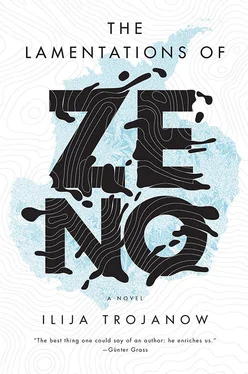Ilija Trojanow - The Lamentations of Zeno
Здесь есть возможность читать онлайн «Ilija Trojanow - The Lamentations of Zeno» весь текст электронной книги совершенно бесплатно (целиком полную версию без сокращений). В некоторых случаях можно слушать аудио, скачать через торрент в формате fb2 и присутствует краткое содержание. Год выпуска: 2016, Издательство: Verso, Жанр: Современная проза, на английском языке. Описание произведения, (предисловие) а так же отзывы посетителей доступны на портале библиотеки ЛибКат.
- Название:The Lamentations of Zeno
- Автор:
- Издательство:Verso
- Жанр:
- Год:2016
- ISBN:нет данных
- Рейтинг книги:5 / 5. Голосов: 1
-
Избранное:Добавить в избранное
- Отзывы:
-
Ваша оценка:
- 100
- 1
- 2
- 3
- 4
- 5
The Lamentations of Zeno: краткое содержание, описание и аннотация
Предлагаем к чтению аннотацию, описание, краткое содержание или предисловие (зависит от того, что написал сам автор книги «The Lamentations of Zeno»). Если вы не нашли необходимую информацию о книге — напишите в комментариях, мы постараемся отыскать её.
The Lamentations of Zeno is an extraordinary evocation of the fragile and majestic wonders to be found at a far corner of the globe, written by a novelist who is a renowned travel writer. Poignant and playful, the novel recalls the experimentation of high-modernist fiction without compromising a limpid sense of place or the pace of its narrative. It is a portrait of a man in extremis, a haunting and at times irreverent tale that approaches the greatest challenge of our age — perhaps of our entire history as a species — from an impassioned human angle.
The Lamentations of Zeno — читать онлайн бесплатно полную книгу (весь текст) целиком
Ниже представлен текст книги, разбитый по страницам. Система сохранения места последней прочитанной страницы, позволяет с удобством читать онлайн бесплатно книгу «The Lamentations of Zeno», без необходимости каждый раз заново искать на чём Вы остановились. Поставьте закладку, и сможете в любой момент перейти на страницу, на которой закончили чтение.
Интервал:
Закладка:
Das Gestern, das mich flieht, kann ich nicht halten,
Das Heute drückt mich wie ein Frauenschuh.
Die kleinen Wandervögel schon entfalten
Die Flügel herbstlich ihrer Heimat zu.
Ich steige auf den Turm, die Arme weit zu dehnen,
Und fülle meinen Becher nur mit Tränen.
“Translate it for me,” Paulina requests as she so often does when she looks at a page I have filled with my scribbling. If I translate that into English it won’t make much sense, I say, pushing back my chair, but if I translate it into Paulinish we’ll both understand it better. My hands have taken hold of her wrists, my lips caress her neck, she pulls back and retreats to the bed. “Every word has at least two possible meanings,” I mumble, a left-handed clumsy meaning, my mouth sucks hard, and an always-has-to-be right meaning, my mouth leaves one nipple and wanders to the other, slowly crossing the hollow between her breasts, the tip of my tongue drumming against her skin.
“I’d like to come inside you without you noticing.”
“You say the craziest things.” And here it is again, this laugh, the most lovable thing about Homo sapiens , and I say: “Yes.” More than that would be too much chatter, her laugh turns to moaning, we are sinking, air bubbles rise to the surface of the water, we are sinking, everyday colors vanish from sight, we tarry in the deep as if we could hold our breath as long as we wanted. When we surface I listen with one ear to the latest rumors which she stirs up the way a gust of wind blows a raked pile of dried leaves (it’s a feast for the ears when she and Esmeralda fill the refrigerators every morning. Their mouths rattle away like sewing machines, snatches of overheard conversations are immediately reworked into colorful elaborations, while the bottles clink and clink as they’re taken out of the boxes and loaded side by side.) At the beginning of our relationship I was worried that her liaison with me might damage her esteem in the eyes of her fellow Filipinos, but in fact the opposite happened, when it comes to cruise ships in the deep southern latitudes I’m evidently considered a good catch. I open the curtains, the expedition leader is entitled to a good view, Paulina was used to windowless sleep — the only thing that’s the same in all the rooms is the screens.
And now there came both mist and snow,
And it grew wondrous cold:
And ice, mast-high, came floating by,
As green as emerald.
Paulina maintains that German sounds beautiful, she doesn’t learn any vocabulary, she catches useless words such as Waschlappen, Hauruck, Kasperltheater (which in her rendition has limited recognition value) and inserts them into the least appropriate situations. I’m sitting undressed on the edge of the bed, looking at half of myself in the mirror that’s mounted on the bathroom door. The years have not simply passed, they’ve folded themselves into my skin, deposited themselves on my hip, and there’s no reason to assume the invisible half might show anything more reassuring, it’s a mystery to me how Paulina manages to ignore everything that by rights should dampen her desire. Instead she leans forward and her lips touch my scrunched-up penis with the lightness of a scarf grazing the skin.
Fog is setting in, it’s not rising off the sea but hovering above it, just enough to let the light safely in its lock before passing it to another level. Now the iceberg behind is discernible only by its base. A bird slips out of the mist and flutters past. “And a good south wind sprung up behind; / the Albatross did follow.” “We humans have eyes made for hunting,” says Jeremy, “our nose could fall off without great loss to our senses, our ears serve only to uglify our face, but our eyes are sharp and alert, they can be relied upon.” “Especially,” I add, “when they fix on something in order to kill it.”

Get a move on, bigmouth, no I’m afraid we don’t have any hotels here, no guest rooms either, you know we never get visitors unless they’ve lost their way. The Urd is already in position and has begun rescuing the passengers, but it can’t take everyone so the rest will have to be divided among the other ships. Get a move on, trackdog, don’t lose that scent, estimated arrival is in forty-five minutes, the Spanish girls are lovely, rent-a-friend, oh yes indeed they are, a friend for rent, cut. As soon as we heard the sound of the motors someone suggested we should form the SOS again, as a warning sign, with us on the ice and not a ship in sight. Pipe down, 24 percent of those polled believe that nature has its own right to exist, but the ladies of Calcutta, blackbirds are dropping dead from the sky, cut. We had already begun to disperse, although the lecturers kept trying to herd us back together, we probably could have managed to make a smaller SOS, everyone immediately wanted to make the O. Cut, two cotton candies and two carousel rides for the price of one gingerbread heart, first the saplings burn, then the shrubby underbrush, the young trees, the dead wood, and all that just fans the fire, the price never reveals the truth. We formed the O very quickly, it was way too big given our numbers, someone called out, come on over here, let’s make the S, I could hear people screaming in other languages, cut. Don’t give up, go hog-wild, cool off, best put your hopes on ice, cut. I hurried over to help out with the S, thinking surely we can pull that off, in any case it was a lot smaller than the O, and that was it, we didn’t get any further, cut. The wildfire reaches the flashpoint and consumes the tallest trees, it blazes away, hotter and stronger than ever, starlings are dropping dead from the sky, are sweeter by far, then comes the third fire that burns everything away, destroying all life, the third fire is the inferno that burns down the world once and for all, cut BREAKING NEWS STRANDED PASSENGERS RESCUED FROM ICE BREAKING NEWS STRANDED PASSENGERS RESCUED FROM ICE all ablaze

8. 62°12′9″S, 58°56′43″W
ON MY FIRST trip to the farthest south I emailed Father a few photos—“penguins & son,” “frosty morning mood,” “sea meets sky,” “land of ocean”—using the address of the director of the assisted living home, with the request she show them to him on her computer. His reaction was predictably gruff: how disappointing you didn’t just vanish into the unknown. If this Internet business can stretch its tentacles that far then there’s no place left on the planet where a person can really be alone. I should have thought twice before clicking send, given Father’s general outlook. When he looks beyond the horizon he’s not longing to find Atlantis, he doesn’t dream of crossing the desert to Timbuktu or discovering Shangri-La — all he wants is the peace and quiet of a solitary hike. He couldn’t possibly understand why I get antsy if I miss my routine fix on the website of the European Space Agency (by way of the WLAN connection on Deck 4) where I track the breakup of the Antarctic Ice Shelf. I know it’s proceeding at a pretty fast clip, so why do I have to keep verifying the fact? I still haven’t told my father anything about King George Island, otherwise his notion of the virgin icescape would be trampled on by boots both moon and military. Even as Expedition Leader I can’t keep us from landing here, we couldn’t put in at Elephant Island because of wind speeds exceeding 56 miles per hour, so we don’t have any other option. King George Island is 90 percent ice, 10 percent research stations and penguin colonies, that’s how I would have to describe it to him, the stations are a few decades old, the colonies have been here for 30,000 years. The island counts as a spearhead of human settlement because it houses the only hotel in the Antarctic, the Estrella Polar (except the hotel has closed down and Polaris can’t possibly be seen from these latitudes), as well as a military outpost for the Chilean Air Force, which can also be used as a jumping-on point by impatient ecotourists who contrive to bypass the Drake Passage. The landscape is infested with research stations. Every country that wants a say in the future of the Antarctic, I would explain to Father, has to maintain a permanent station, and the most economic place to do that is King George Island. Russia, China, Korea, Poland, Brazil, Uruguay, Argentina and Germany are all vying for the Antarctic Cup. The bases are close together, which would hardly seem to foster any sense of scientific rigor, while at the same time feeding the suspicion there’s more rummy than research going on, that people are just biding their time waiting for the day they’re allowed to drill for oil and not just ice (at present all truly groundbreaking research is being conducted deep in the ocean or far inland, during the summer the field teams are always on the go, camping out on the ice). Every now and then we visit Chile’s Eduardo Frei Station. The sight of the settlement rising from the shore, the makeshift buildings — bank, post office, store, school and hospital — delights the passengers, it’s practically a normal village, there are women and children, it flies the national flag, issues its own stamps, and sends newly minted Chilean citizens into the world who with every cry for their mother’s breast advance their country’s claim to the Antarctic peninsula. How is it possible that neither the Soviets nor the Americans have launched a highly pregnant woman into space just so she could give birth to the first extraorbital baby and thereby establish a legitimate claim to the solar system, the galaxy and the universe itself? I would tell Father that we’re avoiding the Russian station Bellinghausen on account of the many derelict oil drums, the wreckage and scrap iron that litter the shore, exposing the true legacy of the human race: rusty garbage. But there’s also a colony of chinstrap penguins, we put in close to that, the calls of the black-and-white-uniformed animals merge with that of the red-uniformed humans into a kind of high-pitched cacophony as the extraterrestrials land, equipped with curiosity but lacking a common tongue. But the chinstraps may be more used to such intrusions than we think, as El Albatros explains, between the launch of one Zodiac and the arrival of another: evidently they’re equally unable to communicate with the gentoo penguins who stray into their colony, it’s not even certain the chinstraps notice the interlopers. But the passengers do notice the natives, they savor every minute they are allotted with the penguins, we have to insist loudly and urgently when it’s time to go back. As the passengers come ashore I stand with one leg in the water next to a metal stepstool that allows them to take hold of my arm and land on relatively dry ground while I mumble polite mantras — even if after two hours in the freezing water I’m ready to chase off every Antarctic tourist with a savage grimace and a primal scream. A stream of phosphorescence streaks through the water, I steady the Zodiac, a spritely Swede climbs in and shows me his drawing of a penguin with its beak pointed skyward, a few strokes, the barest approximation, a large inflatable assault craft rushes past full of soldiers, the Chilean flag painted on the side of the bow, it comes dangerously close before veering away, leaving a wake that causes me to lose my grip on the dinghy, and then makes land not far from us, right in the middle of a large flock of penguins who reluctantly waddle apart. The first soldier jumps off and immediately lights a cigarette. He takes a few steps inland and stands right in the middle of the colony, his posture relaxed, a cigarette dangling from his mouth. Our passengers, whom we have diligently schooled to keep the proper distance and the appropriate demeanor, stare in disbelief. “Take over,” I say to Jeremy and set off in the direction of the soldier. “Wait a minute,” says Jeremy. “What are you doing?” I call out. The soldier looks at me blankly. I point to his cigarette, and with unmistakable gestures demand that he stop smoking. He ignores me completely, turns to his comrades and smirks, this look-at-me smirk that makes me turn white with rage, I start screaming bits of Spanish, I run up to him, shouting at him to stop, and grab him by the arm. With a single unexpectedly violent motion he shakes me off, I tumble a few steps, then try to lunge at him but fall clumsily to the ground, my face lands in the mud. He takes his pistol out of the holster, releases the safety and points it at me. Suddenly Beate and El Albatros are at my side, they both try to reason with the soldier, in Spanish, they hoist me to my feet and hold me firmly between them, as if they wanted to prove to the soldier what little threat I pose, I stare at the man, shaking, he looks at me with disdain and turns away. El Albatros holds me tight while Beate distracts the passengers who have quickly surrounded us, forming a colony of humans. I stand there without moving for some time, and finally El Albatros decides it’s ok to let go of me. The soldiers have turned their backs to us, they are already marching off, no one can say where to or to what purpose, a few wisps of smoke curl into the air, and I wonder where those cigarettes will be ground beneath their boots. Only now does my body feel the fear and at the same time I am euphoric, a lump rises in my throat and simultaneously disappears.
Читать дальшеИнтервал:
Закладка:
Похожие книги на «The Lamentations of Zeno»
Представляем Вашему вниманию похожие книги на «The Lamentations of Zeno» списком для выбора. Мы отобрали схожую по названию и смыслу литературу в надежде предоставить читателям больше вариантов отыскать новые, интересные, ещё непрочитанные произведения.
Обсуждение, отзывы о книге «The Lamentations of Zeno» и просто собственные мнения читателей. Оставьте ваши комментарии, напишите, что Вы думаете о произведении, его смысле или главных героях. Укажите что конкретно понравилось, а что нет, и почему Вы так считаете.












